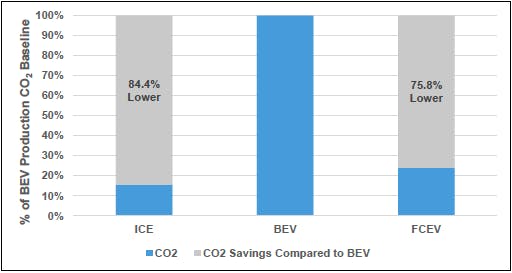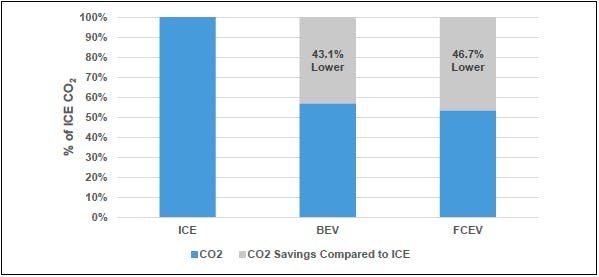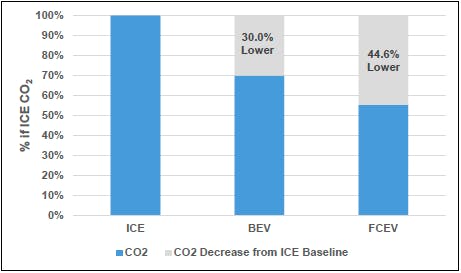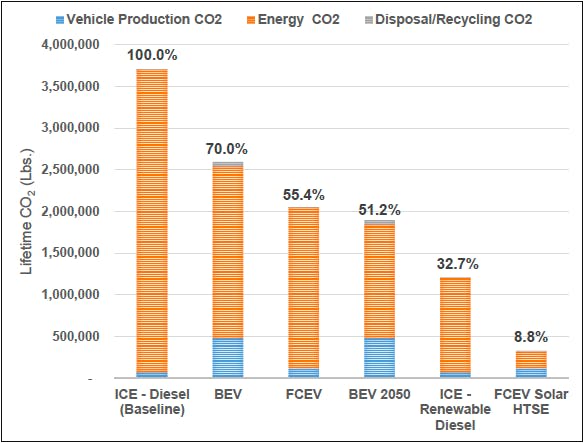New research conducted by the American Transportation Research Institute found that battery-electric Class 8 trucks may not be as environmentally friendly as many believe when considering the full life cycle of the vehicles.
ATRI said that while so-called zero-emission trucks (ZETs), such as battery-electric and hydrogen fuel-cell electric trucks, do not directly release carbon dioxide (CO2) emissions during operation, such emissions are today released during the production of those fuels and the production and disposal of the vehicles and their lithium-ion batteries.
Dan Murray, vice president at ATRI, said the research was identified as a priority by ATRI’s Research Advisory Committee last year “because there’s so much sensational headlines about the future being with electric vehicles,” he said. Ultimately, ATRI set out to determine the operational cost implications of ZETs to the trucking industry and the environmental benefits of the trucks to society at large.
The report compares the full life-cycle CO2 emissions of a modern diesel truck to that of a battery-electric truck and a hydrogen fuel-cell electric truck from production to disposal.
“The results are really quite surprising,” Murray said. “People who sort of view electric trucks as being a panacea" for eliminating CO2 emissions likely "are going to be very, very surprised and probably disappointed.”
To determine the life cycle emissions of each type of truck, ATRI used the Greenhouse gases, Regulated Emissions, and Energy use in Technologies (GREET) model from the Department of Energy’s Argonne National Laboratory. The GREET model is a publicly-available tool that simulates the energy use and emissions output of various vehicle and fuel combinations.
The report found that while diesel trucks produce more CO2 emissions during operation, diesel far outshines both battery-electric and fuel-cell electric trucks in emissions associated with the vehicles' production.
 Internal combustion engines are by far the lowest polluters during the vehicle production process. Mining for and producing the lithium-ion batteries required for battery-electric trucks drives up their CO2 emissions.ATRI
Internal combustion engines are by far the lowest polluters during the vehicle production process. Mining for and producing the lithium-ion batteries required for battery-electric trucks drives up their CO2 emissions.ATRI
The production of a diesel truck produces nearly 75,000 pounds of CO2 emissions, per truck. “Juxtapose that with a battery-electric truck,” Murray said. “Almost 500,000 pounds of CO2 emissions -- much of that related to the mining and production of the battery itself. So we have a vehicle that a lot of folks in the marketplace are calling ‘zero-emissions’ or ‘zero tailpipe emissions,’ and that might be true when you’re on the road. But to get to the road, the battery-electric truck is going to produce almost six times the CO2 as a traditional truck.”
Even a hydrogen fuel-cell truck, Murray added, results in almost twice the CO2 emissions during production as a traditional diesel truck.
“On the production side, if we don’t find ways of developing more sustainable, lower polluting manufacturing processes, the battery-electric truck at the end of the day, at the production level at least, is going to be a black eye on the face of the industry in terms of trying to do the right thing and trying to effect positive changes in the climate,” Murray said.
[Related: Today's very narrow paths to electric vehicles for small trucking]
The actual operation of the vehicles is where battery-electric and hydrogen fuel-cell electric trucks shine compared to a diesel, of course. Diesel trucks produce almost double the operations-related CO2 emissions when compared to the battery-electric (which produces 56.9% of a diesel’s CO2 in operation) or the fuel-cell electric (which produces 53.3% of a diesel’s CO2 in operation).
“This is where, on the road, we start to see some improvements” in the battery-electric and hydrogen fuel-cell trucks, Murray added.
 Battery-electric and hydrogen fuel-cell electric trucks make up for their higher production CO2 emissions during their operational life cycle, with hydrogen fuel-cell electric trucks being slightly cleaner than battery-electric trucks.ATRI
Battery-electric and hydrogen fuel-cell electric trucks make up for their higher production CO2 emissions during their operational life cycle, with hydrogen fuel-cell electric trucks being slightly cleaner than battery-electric trucks.ATRI
Over the operational life cycle of each truck, which for the research ATRI considered 1 million miles, ATRI found that the internal combustion engine produced 3.6 million pounds of CO2 emissions. The battery-electric truck produced just over 2 million pounds of CO2 emissions, and the fuel-cell electric truck produced 1.9 million pounds of CO2 emissions.
Finally, when looking at the emissions associated with vehicle disposal and battery recycling, diesel trucks and fuel-cell electric trucks had a similar footprint. Battery-electric trucks, however, produce 22 times more emissions, primarily due to the recycling of the lithium-ion batteries.
With all factors considered, fuel-cell electric trucks were found to be the likely most beneficial to the environment with CO2 emissions 44.6% lower than a traditional diesel truck. Battery-electric trucks only saw a 30% reduction in full life cycle emissions compared to a diesel truck.
 Over the full life cycle of each truck, the hydrogen fuel-cell electric is the cleanest of the three. Battery-electric trucks only see a 30% reduction in CO2 emissions over their life cycle.ATRI
Over the full life cycle of each truck, the hydrogen fuel-cell electric is the cleanest of the three. Battery-electric trucks only see a 30% reduction in CO2 emissions over their life cycle.ATRI
“We have a bad habit of not looking at life-cycle implications,” Murray said. “We look at a mile on the road and say, ‘Jeez, these electric vehicles are awesome, aren’t they?’ And they are. It’s to get to the road and to get off the road where the real-world costs start to add up dramatically.”
Also worth noting is alternative fuels that can be used in existing diesel engines, such as biodiesel and renewable diesel. ATRI found that these fuels significantly reduce CO2 emissions through the life of the truck, and truck owners don’t have to cover the upfront costs of a battery-electric truck, roughly twice what a comparable diesel costs today.
[Related: Cutting through the heavy-duty etrucks hype]
ATRI actually found that using renewable diesel in a traditional diesel engine would be significantly more beneficial to the environment than all other trucks except for a fuel-cell electric truck powered by solar rather than batteries. Murray noted, however, that renewable diesel isn’t widely available in the U.S. today, and most of what is available here is imported.
 ATRI found that a hydrogen fuel-cell electric truck harnessing wind and solar for energy will be the cleanest truck available. Surprisingly, a modern internal combustion engine using renewable diesel fuel would be the second-cleanest truck, even compared to a modern fuel-cell electric, the projected emissions of a battery-electric truck in 2050 and a modern battery-electric truck.ATRI
ATRI found that a hydrogen fuel-cell electric truck harnessing wind and solar for energy will be the cleanest truck available. Surprisingly, a modern internal combustion engine using renewable diesel fuel would be the second-cleanest truck, even compared to a modern fuel-cell electric, the projected emissions of a battery-electric truck in 2050 and a modern battery-electric truck.ATRI
“The very cleanest truck out there will be a hydrogen fuel-cell truck that takes advantage of electricity generated from wind and solar,” he added. “In other words, I’ll produce hydrogen with electricity rather than natural gas, and I’ll produce electricity with solar and wind and other alternative energy. Then you get a truck that is really less than 10% CO2 pollution of a diesel truck today.”
Because the cleanest truck will be hydrogen fuel-cell, Murray said it’s worth considering if battery-electric trucks are just a stepping stone to get to that point, “and is an electric truck the best stepping stone, when a diesel engine running on renewable fuel is way cleaner than an electric truck?”
from Overdrive https://ift.tt/W7xKYec



Sourced by Quik DMV - CADMV fleet registration services. Renew your registration online in only 10 minutes. No DMV visits, no lines, no phone mazes, and no appointments needed. Visit Quik, Click, Pay & Print your registration from home or any local print shop.





0 comments:
Post a Comment